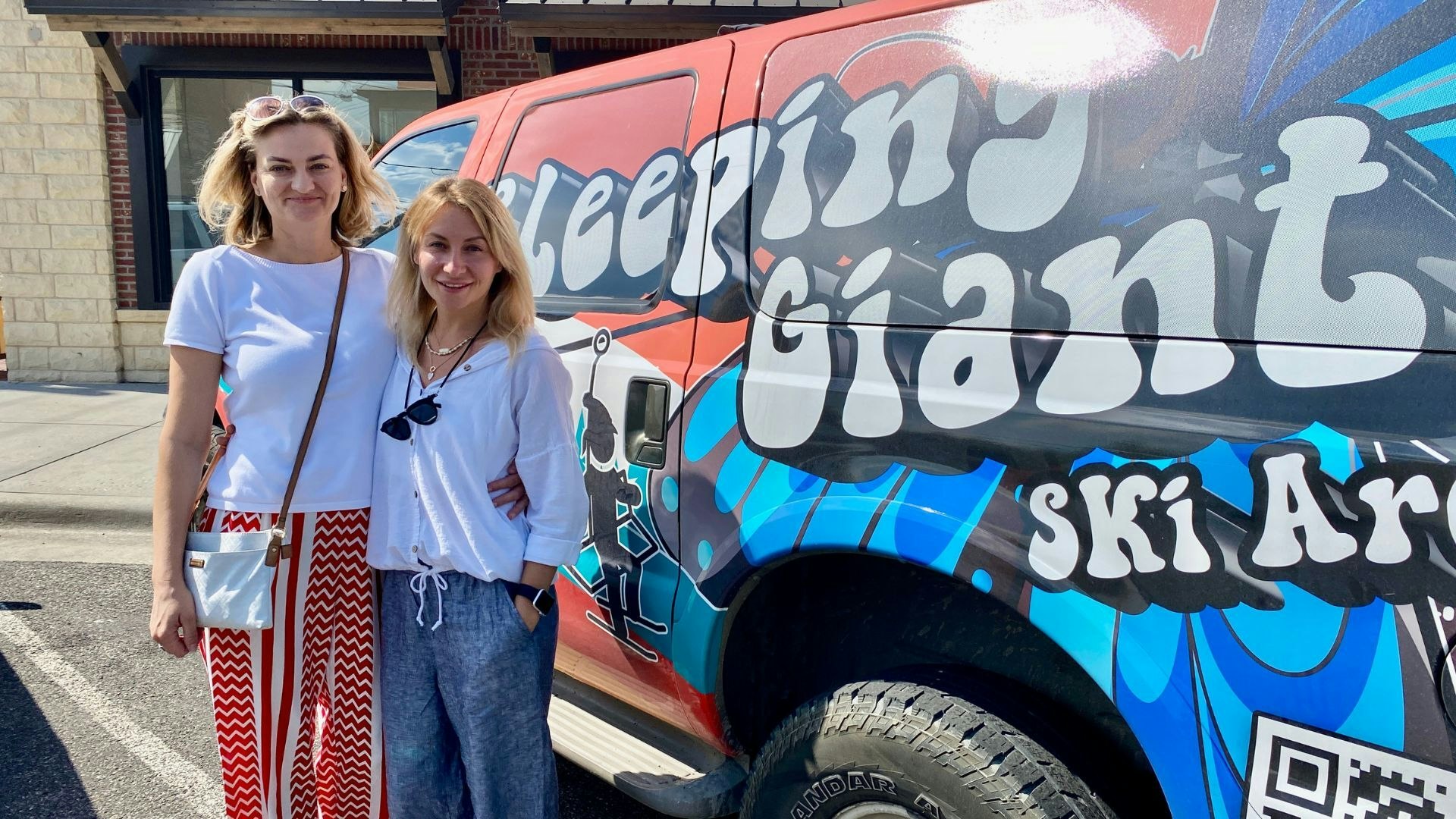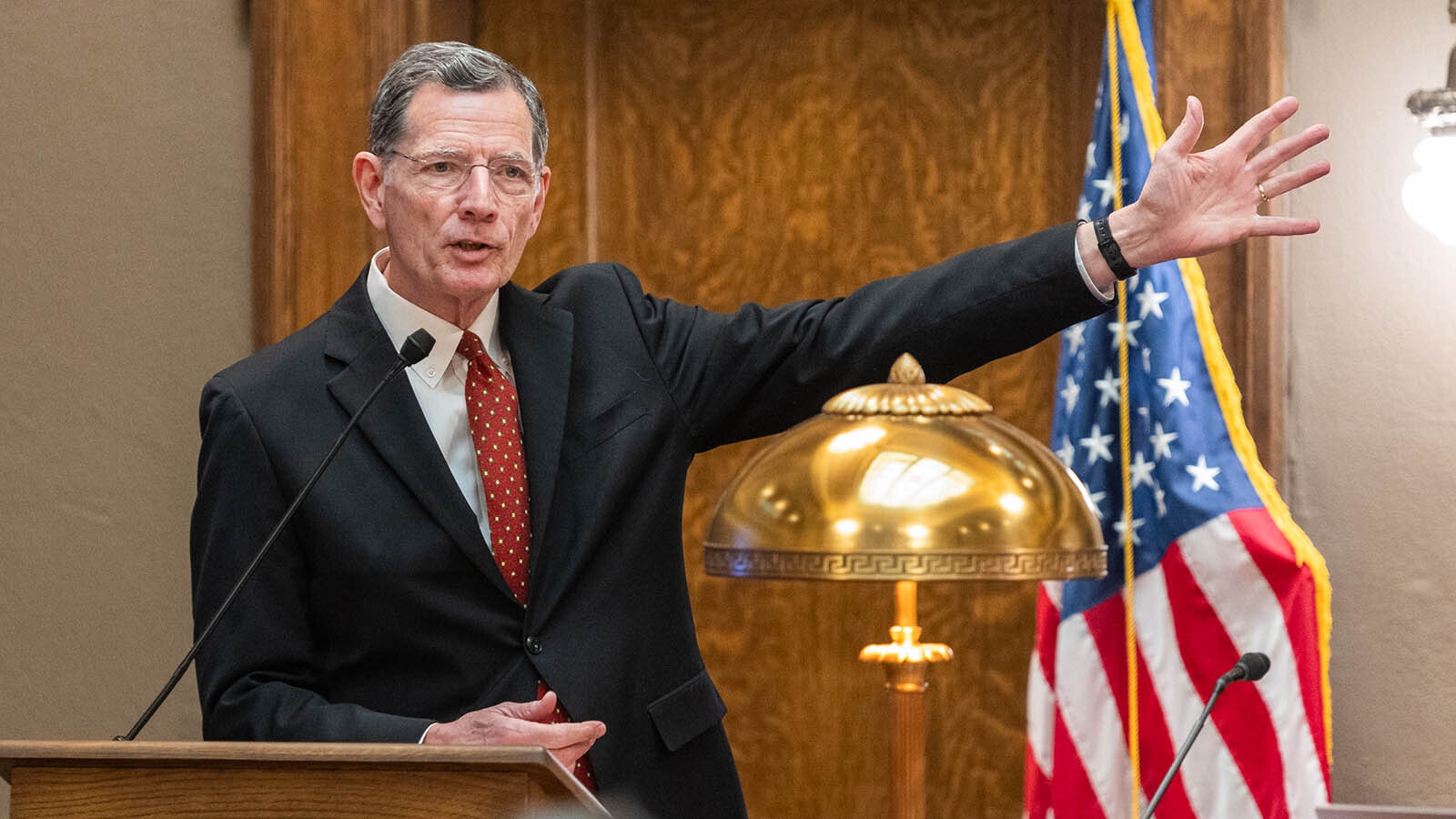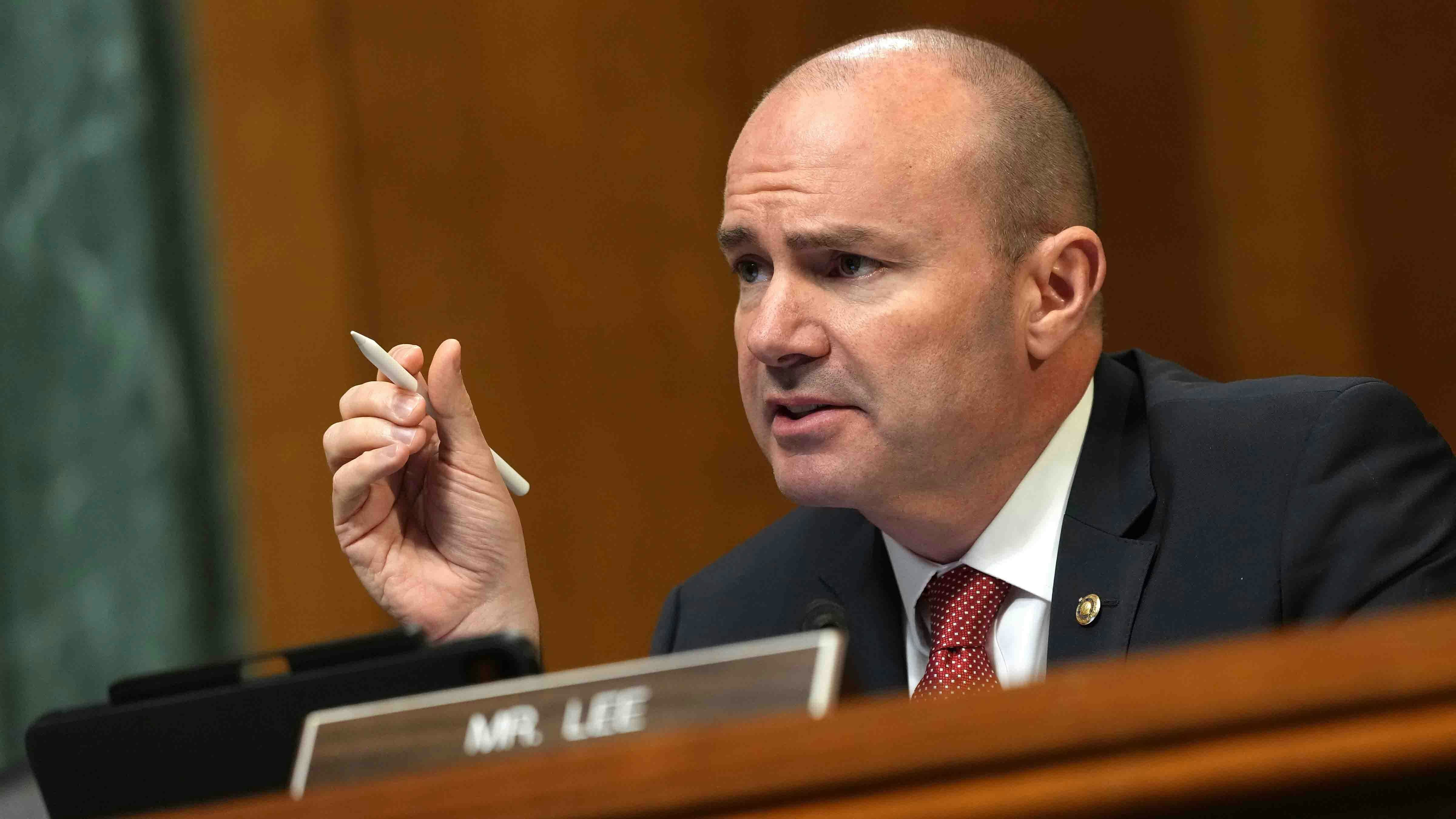By Wendy Corr, Cowboy State Daily
On the other side of the world, on a cold February day, the lives of millions were upended when Russian troops invaded Ukraine.
But two families have found shelter – and safety – in rural Wyoming.
Halyna Matsiakh and Olena Kostiushico and their children were welcomed to Cody by Nick and Yulia Piazza, whose business, SP Capital Management, is based in Ukraine. The women’s husbands are employed by the Piazzas.
When the war started on February 24, the Piazzas, who reside in Cody, did what they could for their employees who were trapped behind enemy lines.
“We had kind of a safe house in Poland, we helped people get there,” Nick Piazza told Cowboy State Daily. “And then we started to realize, this isn’t going to be just for one week or a month. It’s going to be for a while. So we said to all employees that if you want to come to America, we will do whatever we can to get you here.”
Halyna Matsiakh
Sitting in a comfortable chair at SP Capital Management’s office in Cody, Matsiakh is dressed stylishly, with no visible signs that just a few months ago she was a refugee in central Europe, uncertain where she and her six-year-old daughter would have to go next.
Matsiakh’s fashionable demeanor is reflective of her profession – for the last 20 years, she’s been a licensed beautician who managed seven hair salons in Ukraine. On the day the bombs fell in Kyiv, she was getting ready to go to work.
“They’re looking off their balcony and they just see all their neighbors – because they live in a big apartment complex – just kind of pouring out to evacuate, to get out of town,” said Piazza, who was translating for Matsiakh. “And she said her husband thought she was crazy, but she was like, ‘It’s a working day, I’m going to work.’”
However, there was no work that day, or the day after that. For the next three months, Matsiakh and her daughter were migrants, traveling around Europe, while her husband remained behind in Ukraine.
However, because of their family’s ties to the Piazzas, she knew that eventually they would try to come to America.
“We were here,” said Piazza. “And not only us, but in Texas we have mutual friends that we all work with. So from the beginning we were all trying to find a way to get their family over here.”
Olena Kostiushico
The night before war broke out, Kostiushico was at her mother-in-law’s house, where her young daughter was going to stay while Kostiushico planned to go to work at a pharmaceutical company. Because she was in a town not near Kyiv, where the bombs first fell, Kostiushico was unaware that anything was amiss.
“She woke up at six in the morning the day of the war,” translated Piazza. “And she sees that she’s got like five or six missed calls from her mother, who’s here (in Cody), from her husband, from other relatives. And she thought maybe someone in the family had died.”
Her husband told her to grab all of her things and come back to their home about an hour from Kyiv. But Kostiushico laughed him off, not realizing the seriousness of the situation.
“But in the town she drove back to, they have a military base and a training center,” Piazza said. “That night it was bombed and attacked.”
Kostiushico, her two children, and another family packed everything they could in order to evacuate – but that process was painful.
“We tried to fill up a bunch of suitcases,” Kostiushico said as Piazza translated, “but you know, it was really hard because you don’t know what to take. Everything’s kind of chaos and you don’t know when you’re coming back. So what do you take with you? Your whole life in two suitcases?”
Kostiushico said they got in the car and headed west towards Ukraine’s border with Poland.
“And they didn’t know where they were going to stop, where they’re going to stay, but they just knew that they had to not stay there,” Piazza said.
It was on that first chaotic day that Piazza and Kostiushico’s mother called her, and the Piazzas offered asylum in Cody.
Red Tape
Piazza said by the time they were figuring out the logistics of bringing the families to Cody, Kostiushico had found temporary shelter in Poland and Matsiakh in Romania.
At the beginning of the war, the only program the U.S. was able to offer was a tourist visa, Piazza said, but so many people were applying that the women wouldn’t have been able to get into the embassy for an interview until November of 2023.
“So what the U.S. came up with, that I think is a great program, is this ‘United for Ukraine’, which we call U for U,” Piazza said. “And basically, it says, you don’t have to go to an embassy. It puts a lot of the work on the American sponsor.”
He explained that the sponsor must prove financial viability, available living quarters and other services available for any sponsored foreigners. Once that paperwork was complete on the Piazza’s end, Kostiushico and Matsiakh just needed to apply. They were approved within three days.
“They can stay here for up to two years,” Piazza said. “It allows you to work. It provides some language training, some life training – for example, living in a rural town, in Cody, it’s really important to learn to drive, so we have somebody from the Department of Family Services that supports them, and they’re helping them with some of those things.”
Adjusting to Life In Cody
The two women live in apartments that were secured by Piazza once he realized that the families would be relocating to Cody.
“I called around everywhere I could to find some space,” he said. “An acquaintance of mine had a couple of apartments that he was holding for his restaurant, so I made a deal with him and we rented those out for three months.”
Because the Piazzas own the local community ski hill, Sleeping Giant, the women were offered the use of the brightly colored ski vans.
“Only Olena knows how to drive right now,” said Piazza, “so they kind of carpool and do everything together.”
Piazza said in order to work in the U.S. as a non-citizen, there is a significant amount of paperwork, and it takes about 90 days to get a Social Security card. Which means that neither woman is employed just yet – but should be in October.
“They’re allowed to volunteer and help out,” Piazza said, “so they’ve done some of that just to kind of get a feel for how things go here.”
That doesn’t mean that their days are not busy, though.
“There’s a lot of paperwork to do,” Piazza translated for Matsiakh. “Getting the kids ready for school, figuring out how all that works.”
And the women themselves are studying – both are learning English, which Matsaikh is a bit further along with than Kostiushico at the moment. Kostiushico is continuing online psychology courses, while Matsaikh has reached out to the Wyoming cosmetology licensing department.
“As soon as she has her right to work, she’ll probably be taking the exam for cosmetology,” said Piazza.
Generosity of Cody Residents
Furnishing the apartments was a bit of an issue, because in Europe, Piazza said, most apartments come fully furnished.
“I was like, ‘Why don’t you try (the Facebook group) Cody Area Classifieds?’” Piazza said. “So actually, I would say the majority of furniture came from Cody Area Classifieds.”
But much of what they needed was actually donated, Piazza said.
“Funny story, when they went to the Bargain Box (donation store), Emma, the manager, asked where they were from, and they were like, ‘Ukraine,’” Piazza said. “And she said, ‘Just take whatever you want.’”
“Big heart,” said Kostiushico, holding her hand to her heart, indicating the people who have been so helpful.
“When you’ve been living on couches and stuff for several months, to arrive and have a fully decked out place to live, and it’s yours again, and you kind of have some normalcy, it was great,” Piazza translated for Kostiushico.
Overcoming Language Barrier
Piazza said his wife, Yulia, is the primary translator for the families, as she is a native Ukrainian. But when it comes to the children at school, Nick and Yulia’s son has stepped up.
“One (of the Ukrainian children is) in high school, but the two younger girls are at Livingston where my son is,” Piazza said. “So he actually goes in and sees their teacher in the morning and helps get the day set up for them, so they know what to expect.”
But he said the girls are adapting well to their new community.
“I think in whole, they’re making friends, they’re having fun,” Piazza said.
Kostiushico said, through Piazza, that her 15-year-old son likes it at Cody High School.
“My son said right away that this is really cool,” she said, while acknowledging that her daughter is more sensitive to change.
“It’s been tough for her, because we were in Poland for a while and bouncing around at the end of the school year,” Kostiushico said. “And she cried a lot, and she didn’t like it. But she came here and said, ‘Mom, we’re not changing any more schools. I like it here.’”
Navigating the Future
For Matsiakh, who came to Cody from a city of nearly 3 million people, coming to a town the size of Cody was an adjustment. But because of the friendliness of the Cody people, the adjustment has been easier.
“One of the things that’s been really kind of surprising is that they don’t really feel like immigrants here,” Piazza said. “People here don’t know the language, don’t know the culture, and they’re still helping them out. So it’s been a big, positive surprise.”
As much as they miss their home, Matsiakh said they realize this is the best place for their families.
“We understand we can’t go home because it’s not safe for our children,” she said.
And while the women say they miss their husbands, who are forced to stay behind in their native country, they will make it through.
“We’re Ukrainians, and this is what we have to do,” said Matsiakh.





